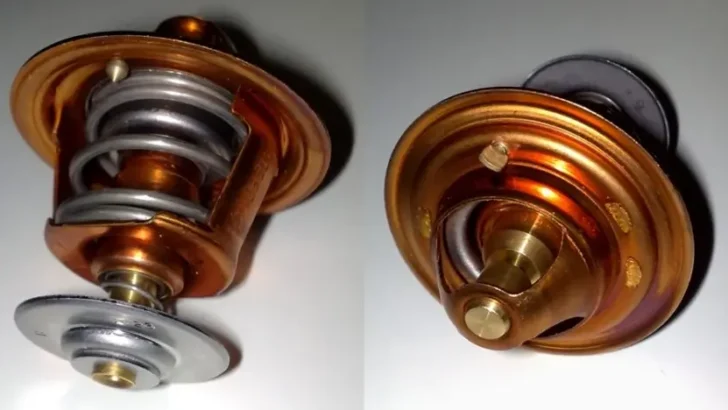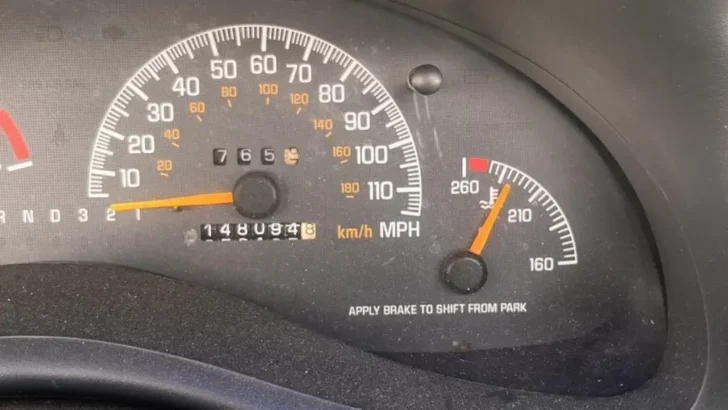You probably ask yourself ”why is my car overheating but it has coolant in it?” A lot of people think that engines overheat only when the cooling system has low levels of coolant.
But, that is not always the case. Your car could be good on coolant and the engine can still overheat. Here is why:
Key Takeaway
- A car can overheat despite having coolant in it due to various reasons such as a faulty thermostat, airflow issues, inadequate coolant levels, blocked coolant passageways, cooling system leaks, faulty radiator fan, broken water pump, clogged coolant hose, frozen shut thermostat, air trapped in the system, or a failed water pump.
Why Is My Car Overheating But It Has Coolant In It

- Faulty thermostat
- Airflow issue
- Inadequate coolant level
- Blocked coolant passageways
- Cooling system leaks
- Faulty radiator fan
- Broken water pump
- Clogged coolant hose
- Frozen shut thermostat
- Air trapped in the system
Faulty thermostat

If a car is overheating despite having coolant, a faulty thermostat could be the culprit. The thermostat regulates the flow of coolant through the engine. If it gets stuck in the closed position, it restricts the coolant flow and can lead to overheating.
Airflow issue

An airflow issue can also cause a car to overheat even if there is coolant present. This can occur if there is a problem with the radiator fan or if there are obstructions blocking the airflow to the radiator. Without proper airflow, the coolant cannot effectively dissipate heat, resulting in overheating.
Inadequate coolant level
While having coolant in the car is important, an inadequate coolant level can still lead to overheating. If the coolant level is too low, there may not be enough coolant to properly cool the engine. It is crucial to regularly check and maintain the coolant level to prevent overheating issues.
Blocked coolant passageways
If the coolant passageways in the engine become blocked due to deposits, rust, or debris, it can hinder the proper flow of coolant. This restriction in flow can cause the engine to overheat, even with coolant present. Flushing the cooling system or using a coolant system cleaner can help address this issue.
Cooling system leaks
Cooling system leaks can result in a loss of coolant, leading to overheating. It is important to inspect the various components of the cooling system, such as hoses, radiator, water pump, and gaskets, for any signs of leakage. Repairing or replacing the affected parts can help resolve this issue.
Faulty radiator fan
The radiator fan helps in cooling the coolant by pulling air through the radiator. If the fan is not functioning properly, it can result in inadequate cooling, causing the car to overheat. Checking the fan motor, relays, and fuses can help identify and rectify any issues with the radiator fan.
Broken water pump
The water pump circulates coolant throughout the engine, helping to regulate its temperature. If the water pump becomes faulty or fails completely, it can hinder the circulation of coolant, leading to overheating. Replacing the broken water pump is necessary to resolve this issue.
Clogged coolant hose
A clogged coolant hose can restrict the flow of coolant and impede proper cooling. This can occur due to debris, sediment, or mineral deposits accumulating in the hose over time. Flushing or replacing the clogged coolant hose can help restore normal coolant flow and prevent overheating.
Frozen shut thermostat
In cold weather conditions, the thermostat may freeze shut, preventing the proper flow of coolant. This can cause the engine to overheat despite having coolant. To address this issue, warming up the car in a heated environment or using a coolant with antifreeze properties can help prevent the freezing of the thermostat.
Air trapped in the system
If there is air trapped within the cooling system, it can disrupt the flow of coolant and lead to overheating. Bleeding the air from the system by using the designated bleeder valve or following the manufacturer’s instructions can help eliminate this issue and ensure proper coolant circulation says Protect My Car.
How Can I Prevent an Overheated Engine?

- Regularly check and maintain the coolant level.
- Keep an eye on the temperature gauge while driving.
- Inspect and replace a faulty thermostat.
- Ensure proper airflow to the radiator by keeping it free from obstructions.
- Flush the cooling system periodically to remove deposits and debris.
- Check for and repair any cooling system leaks promptly.
- Maintain the condition of the radiator fan and replace if necessary.
- Regularly inspect and maintain the water pump.
- Keep the coolant hoses clean and clear of clogs.
- Use coolant with antifreeze properties in colder climates.
- Properly bleed the air from the cooling system after maintenance or repairs.
Is It Safe To Drive An Overheating Car?
Driving an overheating car is not safe and can lead to serious damage to the engine, as well as potential dangers to you and your passengers.
Ignoring an overheating engine can cause irreparable harm to the motor, and the odds are that it will overheat again if you continue driving.
It is essential to find a safe place to pull over and let the engine cool down before attempting to drive again.
FAQs
Q: What are the common causes of a car overheating?
A: There are several common causes of car overheating.
Some of these include a low coolant level, coolant leaks, a malfunctioning thermostat, a faulty radiator, a broken water pump, a clogged radiator, a blocked coolant hose, a faulty cooling fan, or an issue with the coolant flow.
It is important to address the overheating issue promptly to avoid further damage to the engine.
Q: How can a coolant leak cause a car to overheat?
A: A coolant leak can cause a car to overheat because it reduces the amount of coolant available in the cooling system.
Without enough coolant, the engine cannot effectively regulate its temperature, leading to overheating. It is important to identify and repair any coolant leaks to prevent overheating and engine damage.
Q: Can low engine oil level cause the engine to overheat?
A: Yes, a low engine oil level can cause the engine to overheat. Engine oil helps to lubricate and cool the various moving parts of the engine.
If the oil level is too low, the engine may not be properly lubricated, leading to increased friction and heat. It is important to regularly check and maintain the engine oil level to prevent overheating.
Q: How does a faulty thermostat cause a car to overheat?
A: The thermostat is responsible for regulating the flow of coolant through the engine. If the thermostat is faulty and fails to open or close properly, it can disrupt the coolant flow, leading to overheating.
A stuck closed thermostat can prevent coolant from flowing through the radiator, while a stuck open thermostat can cause the coolant to circulate continuously without reaching the desired operating temperature. In either case, the engine may overheat.
Q: What role does the radiator play in preventing engine overheating?
A: The radiator is a crucial component of the car’s cooling system. It helps to dissipate the heat generated by the engine by transferring it to the surrounding air. The coolant flows through the radiator, and as it passes through the radiator’s fins, the heat is released.
If the radiator is damaged or not functioning properly, it may not be able to effectively cool the coolant, leading to engine overheating.
Q: How does a malfunctioning water pump contribute to engine overheating?
A: The water pump is responsible for circulating the coolant through the engine and radiator. If the water pump is not functioning properly, it can impede the coolant flow, leading to inadequate cooling of the engine.
A malfunctioning water pump can result from issues such as a worn-out impeller, a leaky seal, or a bearing failure. It is important to have the water pump inspected and replaced if necessary to prevent engine overheating.
Q: Can a faulty cooling fan cause the car to overheat?
A: Yes, a faulty cooling fan can cause the car to overheat. The cooling fan helps to dissipate the heat from the radiator by blowing air over it. If the cooling fan is not functioning properly, the radiator may not receive adequate airflow, leading to poor cooling performance.
This can result in engine overheating, especially in slow-moving or idle situations. It is recommended to have the cooling fan checked and repaired if necessary.
Q: How can a coolant system flush help prevent engine overheating?
A: A coolant system flush involves draining the old coolant from the system and replacing it with fresh coolant. This process helps to remove any contaminants, sediment, or debris that may have accumulated in the system, improving the coolant’s effectiveness in regulating the engine’s temperature.
A coolant system flush can help prevent overheating by ensuring proper coolant flow and heat transfer within the engine.
Q: What should I do if my car is overheating?
A: If your car is overheating, it is important to take immediate action to prevent engine damage. Here are some steps you can take: – Pull over to a safe location and turn off the engine. – Allow the engine to cool down before opening the hood.
Check the coolant level in the reservoir. If it is low, add coolant (once the engine has cooled) until it reaches the proper level. – Inspect the radiator, hoses, and water pump for any visible signs of leaks or damage. – Check if the cooling fan is functioning properly.
If necessary, call for roadside assistance or have the car towed to a professional mechanic for further inspection and repairs.
In Conclusion
It is important to check for potential causes of why your car could be overheating even with coolant in it.
This could include issues such as a bad or clogged radiator cap, low levels of coolant, a faulty thermostat, and blocked airflow through the radiator.
